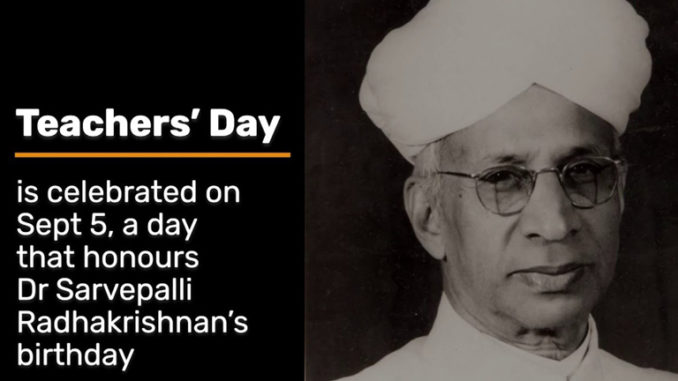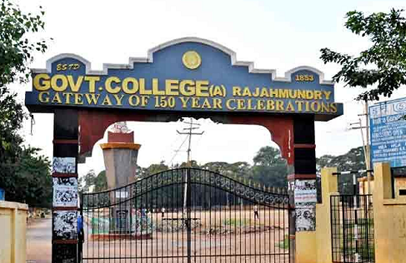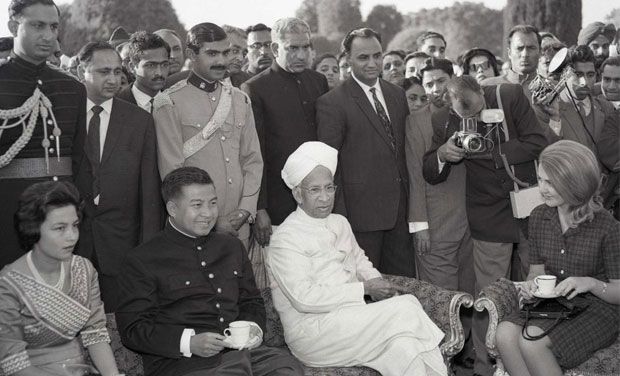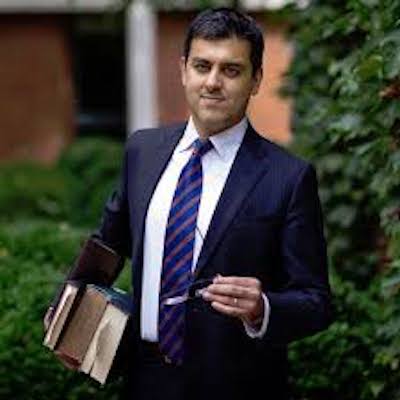
Dr. Sarvepalli Radhakrishnan’s birthday on September 5 is celebrated in India as Teacher’s Day

Margaret Mead, a great American Anthropologist, when she was a little girl, asked her father, who was a professor, “Father, who is a professor? He replied, “Professor is one who keeps learning, and teaches what he learned”. What an extraordinary and unusual reply!
Dr. Radhakrishnanwas a teacher, scholar, philosopher and humanitarian par excellence. His birthday, September 5th, is celebrated in India as Teacher’s Day. I will essay to summarize Dr. Radhakrishnan’s life as a teacher.
Plato’s concept of philosophy king and the Indian idea of Rajarishi have striking similarities. The idea was realized in Marcus Aurelius, Janaka, Emperor Ashoka and Akbar. In modern times Dr. Radhakrishnan exemplifies this concept when he was elected President of India in 1962. In 1964, the Pope conferred on Dr. Radhakrishnan, in a declaration, as one of the Chiefs of Golden Army of Angels.
Early life
Radhakrishnan was born on Sept 5th, 1888, in Thiruttani, a small town near Andhra Pradesh-Tamil Nadu border in a Telugu speaking family. Dr. Radhakrishnan’s family background coupled with his early demonstrated aptitude for learning took him in gradual stages to school and college. During his college days at Christian College, Madras, one of his senior cousins made him a gift of his old books-Stout’s psychology, Welton’s Logic, and Mackenzie’s Ethics. He chose philosophy as the main subject of his studies. He later reflects “the subject of philosophy I happened to take up by sheer accident. But when I look at the series of accidents that have shaped my life, I am persuaded that there is more in this life than meets the eye. Life is not a mere chain of physical causes and effects. Chance seems to form at the surface, but deep-down other forces are at work. If the universe is a living one, if it is spiritually alive nothing in it is merely accidental. The moving finger writes and having writ moves on.”
The Christian atmosphere in Madras Christian College had both a positive and negative experiences on the mind of the young Radhakrishnan. He aquatinted himself with the teaching of the New Testament.
Teacher at Madras & Rajahmundry
 Government Arts College Rajahmundry now known as Government College (Autonomous) is on the banks of River Godavari in Rajahmundry, Andhra Pradesh. It was established as a Zilla Parishad high school in 1853 and upgraded as a Provincial school of Madras Presidency in 1868. It became a college in 1885. It was affiliated to University of Madras in 1891 and reaffiliated to Andhra University in 1926. Dr. S. Radhakrishnan served as a professor here from 1916 to 1918.
Government Arts College Rajahmundry now known as Government College (Autonomous) is on the banks of River Godavari in Rajahmundry, Andhra Pradesh. It was established as a Zilla Parishad high school in 1853 and upgraded as a Provincial school of Madras Presidency in 1868. It became a college in 1885. It was affiliated to University of Madras in 1891 and reaffiliated to Andhra University in 1926. Dr. S. Radhakrishnan served as a professor here from 1916 to 1918.
In the memory of the great teacher, the Goutami Eye Institute, Rajahmundry, AP and the Eye Foundation of America are sponsoring free eye examination to 100 teachers in the region on September 5, 2021.
———
It has been said he used to give brilliant lectures, unsurpassed in brevity and clarity. According to a veracious source, Radhakrishnan in his twenties was a “bohemian and temperamental, not very disciplined and prone to occasional outbursts of anger,” but in later life he became free from all these tendencies and attained serenity and equipoise. In 1912 his lectures at Presidency were published as essentials of psychology- Oxford University press.
He was such a prolific writer, that before he turned 27, he had already contributed a number of essays. His diversity of interest on such wide-ranging themes as ‘Karma and Free Will’, ‘Nature and Convention in Greek’, ‘Ethics of Bhagavad-Gita and Kant’, ‘Bergson’s Idea of God’, ‘Morality and Religion in Education’, ‘A View from India on the War I’. These appeared in journals of international repute, such as, The Monist, The Quest, Mind, Journal of Philosophy and The International Journal of Ethics. His Second essay on ‘A view from India on the War I’ was not allowed to be published by the censors. In 1916, Radhakrishnan was promoted as a Professor and placed in the Provincial Grade and was posted at the Government Arts College, Rajahmundry. (AP) He soon became an inspiring and beloved teacher. He stayed in Rajahmundry till 1918. He later said these were the happiest and most fulfilling years of his life.
It was during this period, he worked on the manuscript of his book “The Philosophy of Rabindranath Tagore “which was published in 1918. Describing Tagore’s philosophy, he says”Tagore’s supreme spirit is not an abstract entity residing at a safe distance from the world, but is the concrete, dynamic life at the center of things, giving rise to the roar of the wind and the surf of the sea…Rabindranath is a wholeness of vision which cannot tolerate any absolute divisions.”
From Mysore to Calcutta
Radhakrishnan was appointed as professor of IndianPhilosophy at Mysore University in 1916. It was during his Mysore days that he published a series of articles in Mind in which he often examined Bergson’s philosophy, attempted to prove that he was an Absolutist and wrote his second book, ‘The Reign of Religion in Contemporary Philosophy’ which was published in 1920. Examining the philosophies of thinkers like William James, Rudolf Eucken, James Ward, Leibnitz, and others. RK condemned such dominance of religion in philosophy and pleaded for the development of a philosophy in which religion is neither the basis, nor the motivating force.
At University of Calcutta, he became successor to Brajendra Nath Seal (doyen of Indian Philosophy) perplexing many. In 1923, Radhakrishnan’s monumental work, Indian Philosophy Vol 1 was published. The impact of this book was tremendous. It resulted in the vivification of philosophical thought in Indian universities.

He was a Professor in a small town, big cities, Vice chancellor of Andhra University, Banares Hindu University, Spalding Professor at Oxford, Ambassador to Moscow, Vice President and President of India.One can go on and on about Dr. Sarvepalli Radhakrishnan as a great teacher and an extraordinary Philosopher and Humanitarian. It may be said of a philosopher or a scientist that “the essential in the being “of such a man lies “in what and how he thinks, not in what he does or suffers”. This is what Einstein said about himself. Radhakrishnan, for inscrutable reasons, said very little about himself (Acharya Devo Bhava).
(VK Raju MD, FRCS, FACS is a US based Ophthalmologist, Regional Eye Associates; President and Founder, Eye Foundation of America; President and Founder, Goutami Eye Institute; Clinical Professor, West Virginia University; Director, International Ocular Surface Society; Adjunct Professor, GSL Medical School. He can be reached at vkraju@comcast.net. He can also be reached at Mobile / 1+ 304 2882080)





Be the first to comment